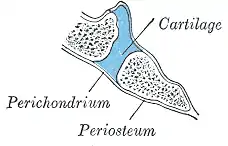Synchondrosis
A synchondrosis (or primary cartilaginous joint) is a type of cartilaginous joint where hyaline cartilage completely joins together two bones.[1] Synchondroses are different than symphyses (secondary cartilaginous joints) which are formed of fibrocartilage. Synchondroses are immovable joints and are thus referred to as synarthroses.
| Synchondrosis | |
|---|---|
 Sagittal section through the clivus of the skull demonstrating the location of the spheno-occipital synchondrosis in an infant. | |
| Identifiers | |
| TA98 | A03.0.00.016 |
| TA2 | 1529 |
| FMA | 7497 |
| Anatomical terminology | |
Examples in the human body
Permanent synchondroses
- first sternocostal joint (where first rib meets the manubrium of the sternum)
- petro-occipital synchondrosis
Temporary synchondroses (fuse during development)
- epiphyseal plates
- apophyses
- synchondroses in the developing hip bone composed of the ilium, ischium and pubis
- spheno-occipital synchondrosis
References
- Dixon, Andrew. "Synchondrosis | Radiology Reference Article | Radiopaedia.org". Radiopaedia. Retrieved 2020-06-12.
This article is issued from Wikipedia. The text is licensed under Creative Commons - Attribution - Sharealike. Additional terms may apply for the media files.
